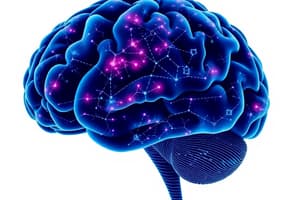Podcast
Questions and Answers
What is psychology?
What is psychology?
Psychology is the scientific study of mind and behavior.
Which figure depicts Eros and Psyche?
Which figure depicts Eros and Psyche?
- Figure 1.1
- Figure 1.3
- Figure 1.2 (correct)
- Figure 1.4
Psychology was accepted as an academic discipline in the 1800s.
Psychology was accepted as an academic discipline in the 1800s.
True (A)
John B. Watson is known as the father of _________ within psychology.
John B. Watson is known as the father of _________ within psychology.
Match the following psychologists with their contributions:
Match the following psychologists with their contributions:
Flashcards are hidden until you start studying
Study Notes
Definition of Psychology
- Psychology is a social science discipline that scientifically studies the mind and behavior.
Origins of Psychology
- The root "psyche" means soul in Greek, and "ology" means study of.
- Wilhelm Wundt is credited as one of the founders of psychology and created the first laboratory for psychological research in Germany.
Early Theories and Approaches
- Functionalism (William James): focuses on the function of behavior, studying the operation of the whole mind rather than individual parts.
- Psychoanalytic theory (Sigmund Freud): focuses on a person's unconscious and early childhood experiences.
- Behaviorism (John B. Watson and B.F. Skinner): studies observable behavior, focusing on behavior control and learned behavior.
Humanistic Approach
- Emphasizes the potential for good that is innate to all humans.
- Carl Rogers developed a client-centered therapy method.
- Abraham Maslow proposed a hierarchy of human needs in motivating behavior.
Cognitive Revolution
- Emerged from the interdisciplinary field of cognitive psychology, which studies mental processes and their relation to behavior.
- Noam Chomsky was influential in beginning the cognitive revolution.
Biological Psychology
- Studies how the structure and function of the nervous system generate behavior.
Sensation and Perception
- Sensory information remains the same, but perception can vary dramatically.
Developmental Psychology
- Studies development across a lifespan.
- Jean Piaget is famous for his theories regarding changes in cognitive ability that occur from infancy to adulthood.
Social Psychology
- Focuses on how we interact and relate to each other.
- Stanley Milgram's research demonstrated how far people will go in obeying orders from an authority figure.
Health Psychology
- Focuses on how health is affected by the interaction between biological, psychological, and social factors.
- The biopsychosocial model suggests that health/illness is determined by an interaction of these three factors.
Clinical Psychology
- Focuses on diagnosis and treatment of psychological disorders and other behavior-based problems.
- Cognitive-behavioral therapists take cognitive processes and behaviors into account when providing psychotherapy.
Studying That Suits You
Use AI to generate personalized quizzes and flashcards to suit your learning preferences.




